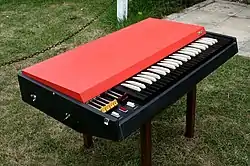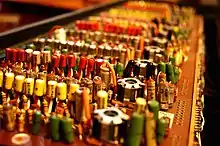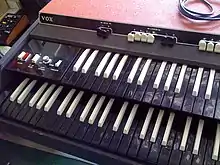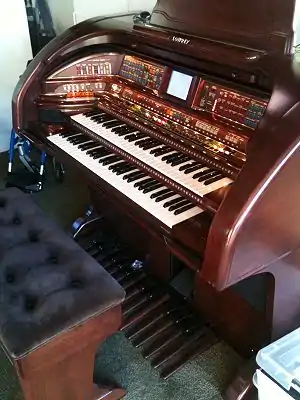Vox Continental
The Vox Continental is a transistorized combo organ that was manufactured between 1962 and 1971 by the musical equipment manufacturer Vox. It was designed for touring musicians and as an alternative to the heavy Hammond organ.

The Continental became a very popular instrument, especially with garage bands, and it can be heard in many 1960s and 1970s hit singles by The Beatles, The Animals, The Doors, Elvis Costello, and The Velvet Underground. After being phased out of production in the early 1970s, the instrument remained a sought-after combo organ by enthusiasts.
Description

The Continental had two basic designs, each with its own variations. They were the single manual Continental, and the dual manual model called the Vox Continental II in England and the Vox Super Continental in Italy.[1] Each manual features 49 reverse-colored keys (black naturals and white sharps) similar to a harpsichord.[2] The organ comes with a chrome Z-shaped bolt-on leg stand assembly.[3]
The Vox Continental used six slider-type, metered volume controls called drawbars instead of the stop-tab rocker switches seen on other combo organs. Two of the drawbars controlled the voices (flute and reed tones), and three of the other four controlled the footages (in reference to ranks of pipes on a pipe organ). The stock Continental had 16', 8', 4' drawbars, with a fourth one labelled "IV" containing a mixture of higher pitches.[4] There was a single-speed, single intensity vibrato,[lower-alpha 1] but the Continental had no other effects.[6] A bass pedalboard was available as an optional extra.[7] Dual-manual models also had a 5 1/3' drawbar, an octave of bass keys and a string bass feature. Later models also supported a percussion feature similar to that on a Hammond.[8]
The organ's sound comes from twelve oscillators, one for each note in the chromatic scale. The signal from these is fed into a frequency divider circuit, that allows the frequency to be halved, in order to produce the sound an octave lower.[9]
The first Continentals were manufactured with wooden keys covered with plastic key caps. Musicians complained this gave it an unpleasant playing action.[10] Later models switched to using plastic keys.[11]
History

The Vox Continental was first manufactured by the Jennings Musical Instruments factory in Dartford, Kent in 1962. Most of the components for the organ were subcontracted to other companies, with Jennings working on the final assembly. The original cabinets were constructed by Heathpoint Timer in Rayleigh, Essex while some of the electrics were made by Kimber-Allen in Swanley, Kent.[12] Jennings sold part of the company to the Royston Group in 1963.[13] Production later moved to Vox Sound in Erith, Kent.[14] The dual-manual Continental II was introduced in 1965.[8] The Vox Jaguar was introduced as a budget version of the Continental the following year, which used rocker tabs instead of drawbars.[15]
The Continental quickly became popular as it was advertised as part of the British Invasion of the mid-1960s, particularly after being endorsed by the Beatles.[16] In order to increase supply a licensing deal was signed between Jennings and the Thomas Organ Company in the US in 1966.[11] Later that year, production for the US market was moved to EME in Italy for economic reasons; Thomas held a 30% stake in the EME factory, with Jennings and Royston holding 22%.[17] The Italian Continentals used cheaper plastic keys glued to metal shafts, that were easier to break.[18]
In 1967, Thomas manufactured the Voxmobile as a promotional instrument, designed by custom car designer George Barris. It combined a dual-manual Vox Continental with two oversized Vox basses, which were mounted onto a 289cc Ford Cobra engine.[19] The Continental Baroque was introduced in 1968, which combined the usual Continental manual with a multi-timbral one similar to that on other Thomas organs, and included a built-in amplifier. It was considered unreliable and expensive, and didn't sell well.[20]
Jennings struggled to retain control of Vox, and founder Dick Jennings was fired on 19 September 1967, with employees loyal to him leaving shortly afterwards. Royston filed for bankruptcy two years later.[13] The company was bought by Corinthian Securities who attempted to reintroduce a range of Vox Continentals, but by then, groups were preferring to use a Hammond organ and Leslie speaker instead of a Vox. Most of the remaining assets were sold at a liquidation sale in 1971.[19]
There are no definitive figures for how many Vox Continentals were manufactured. However, estimates based on serial numbers show 9,100 single-manual organs were manufactured. Around 4,100 of these come from the UK, followed by 4,000 from Italy and 1,000 in the US.[3]
The Vox name was later sold to Rose Morris, who in turn sold it to Korg in 1992. Since then new products carrying the trademark Vox have been primarily for the guitar player, and the Korg trademark appears on most keyboards.[21] In September 2017, Korg released a workstation-style keyboard named in honour of the Vox Continental and highlighting the particular Continental organ sound, competing with contemporary keyboards such as the Nord Electro.[22][23]
Maintenance
The Vox Continental used relatively unstable germanium transistors in its oscillators, which means they need to be occasionally retuned. The wooden keys on earlier models are more durable than later plastic ones. The organ is connected to the mains via a round three pin Bulgin connector, which was standard for the time but is no longer in general use because it does not meet modern safety standards. Some technicians have retrofitted the power supply on a Continental to take a standard IEC 60320 C14 "kettle plug" lead. The later US and Italian Continentals have a hinged lid, which makes servicing easy.[19]
Because the Continental was designed to be played in concert and used in touring, there are relatively few of them in good condition unless they have been repaired. In particularly, many are missing the original case that carried the stand and volume pedal.[24]
Artists
The instrument was commonly heard in 1960s rock music, and played by the Beatles' John Lennon, the Dave Clark Five's Mike Smith and the Animals' Alan Price.[25] Lennon regularly played "I'm Down" on the Continental as a set closer for the Beatles, such as their 1965 concert at Shea Stadium.[26] The Doors' Ray Manzarek played a Vox early in the group's career, in combination with a Rhodes Piano Bass.[27] Songs that feature the Vox Continental include:
- 1960s
- "The House of the Rising Sun" (1964) and "Don't Let Me Be Misunderstood" (1965) by The Animals
- "Because" and "Glad All Over" (1964) by The Dave Clark Five
- "California Sun" (1964) by The Rivieras
- "Time Is on My Side" (1964) by The Rolling Stones
- "She's About a Mover" (1965) by the Sir Douglas Quintet
- "Pushin' Too Hard" (1965) by The Seeds
- "Woman" (1965) by The Zombies
- "Keep on Dancing" (1965) by The Gentrys
- "I'm Down" and "Think for Yourself" (1965) by The Beatles
- "96 Tears" (1966) by Question Mark and the Mysterians
- "I'm a Believer" and "(I'm Not Your) Steppin' Stone" (1966) by The Monkees
- "Hungry" (1966) by Paul Revere and The Raiders
- "(We Ain't Got) Nothin' Yet" (1966) by the Blues Magoos
- "Working My Way Back to You" (1966) by The Four Seasons
- "Absolutely Sweet Marie" (1966) by Bob Dylan, who also played the Connie on the 1979 tour for his album Slow Train Coming
- "Light My Fire" and "When the Music's Over" (1967) by The Doors
- "The Rains Came" (1966) and "Mendocino" (1968) by the Sir Douglas Quintet
- "Brown Eyed Girl" (1967) by Van Morrison
- "The Letter" and "Neon Rainbow" (1967) by The Box Tops
- "Sister Ray" (1968) and "What Goes On" (1969) by The Velvet Underground
- "In-A-Gadda-Da-Vida" (1968) by Iron Butterfly
- "When I Die" (1969) by Motherlode
Following the 1960s the Vox Continental played a significant role in generating keyboard sound of the 1970s and early 1980s new wave and punk rock. The Continental was used extensively by prodigy Steve 'Nieve' (aka Steve Nason), keyboard player for Elvis Costello & The Attractions, and by Mike Barson of 2-Tone group Madness. It was also used by 2-Tone founder Jerry Dammers of The Specials.
- post-1960s
- "Yo-Yo" and "Down by the Lazy River" (1972) by the Osmonds
- "Don't Stop" (1977) by Fleetwood Mac
- "Don't Do Me Like That" (1979) by Tom Petty and the Heartbreakers
- "Lay Your Love on Me" (1979) by Racey
- "Some of My Lies Are True (Sooner or Later)" and "Don't Ever Tell Me That You Love Me" (1980) by Huey Lewis and the News
- "Stand" (1988) and "Radio Song" (1991) by R.E.M.
- "Why Does the Sun Shine? (The Sun Is a Mass of Incandescent Gas)" (1993) and "Boss of Me" (2000) by They Might Be Giants
- "Past the Mission" (1994) by Tori Amos
- "I Will Buy You a New Life" (1997) by Everclear
- "Budapest" (2014) by George Ezra[28]
- "Beryl" (2015) by Mark Knopfler
More recently in popular music culture, the organist Rhys Webb, of the UK garage band The Horrors can be seen using the Continental, as can Sam Steinig of Mondo Topless and Walt Martin of The Walkmen, while Kenny Howes of Atlanta psyche-pop group Orange Hat used a Super Continental.[29] Benmont Tench of Tom Petty and the Heartbreakers has also frequently used a Vox Continental, and sometimes prefers its "drier, thinner, more cutting sound". On "Don't Do Me Like That", he played one through a Leslie speaker.[4] Singer-songwriter Grayson Hugh featured a Continental on his song "Angel of Mercy" from his 2010 Swamp Yankee Records release "An American Record".
Two Vox Continental organs are seen in the promo video for "Summer in the City" by The Lovin' Spoonful, played by John Sebastian and bassist Steve Boone, although the signature keyboard line is played on a Hohner Pianet. A Vox Continental is seen in use by Eric Harvey of Spoon in the music video for their song "Sister Jack". The Vox can also be seen in several televised appearances by The Four Seasons, played by Bob Gaudio on such performances of "I've Got You Under My Skin" and "Working My Way Back to You". The Vox Continental organ can also be seen in numerous televised appearances of The Dave Clark Five played by lead singer Mike Smith on shows such as The Ed Sullivan Show and Shindig!
Alex Turner also used the Vox Continental for Arctic Monkeys song "505", the closer of second album Favourite Worst Nightmare, as well as on third album Humbug and "Crying Lightning" b-side "Red Right Hand".
The former organist of The Moons, Tom Warmsley, uses a single manual Vox Continental, and another former member, James Edward Bagshaw, uses a Vox Continental 300.
Notes
- The rate of vibrato can be adjusted by removing the lid and adjusting a potentiometer[5]
References
Citations
- Vail & Carson 2000, p. 252.
- Lenhoff & Robertson 2019, pp. 148,167.
- Lenhoff & Robertson 2019, p. 158.
- Lenhoff & Robertson 2019, p. 148.
- Lenhoff & Robertson 2019, p. 149.
- Lenhoff & Robertson 2019, pp. 149,163.
- Lenhoff & Robertson 2019, p. 164.
- Lenhoff & Robertson 2019, p. 168.
- Lenhoff & Robertson 2019, p. 162.
- Lenhoff & Robertson 2019, p. 154.
- Lenhoff & Robertson 2019, p. 156.
- Lenhoff & Robertson 2019, p. 51.
- Lenhoff & Robertson 2019, p. 172.
- Lenhoff & Robertson 2019, p. 154-156.
- Lenhoff & Robertson 2019, pp. 156,169.
- Lenhoff & Robertson 2019, p. 177.
- Lenhoff & Robertson 2019, pp. 156,172.
- Vail & Carson 2000, p. 251.
- Lenhoff & Robertson 2019, p. 173.
- Lenhoff & Robertson 2019, pp. 168–169.
- "The History Of Korg: Part 2". Sound on Sound. November 2002. Retrieved 5 February 2021.
- "VOX Continental". VOX Amplification Ltd. Retrieved 13 February 2019.
- Reid, Gordon (August 2018). "Vox Continental". Sound on Sound. Retrieved 5 February 2021.
- Lenhoff & Robertson 2019, p. 174.
- Vail & Carson 2000, p. 250.
- Lenhoff & Robertson 2019, pp. 148,164.
- Lenhoff & Robertson 2019, p. 175.
- http://headphonedaydreams.wordpress.com/2014/07/27/now-88/
- Orange Hat's video for Liquid Me, featuring the Vox Super Continental.
Sources
- Lenhoff, Alan; Robertson, David (2019). Classic Keys: Keyboard sounds that launched rock music. University of North Texas Press. ISBN 978-1-57441-776-0.
- Vail, Mark; Carson, Barry (2000). Vintage Synthesizers. Backbeat Books. ISBN 978-0-879-30603-8.
External links
- The history of the Vox Continental in detail: www.reinout.nl
- Vox - Combo Organ Heaven
- Vox Showroom
